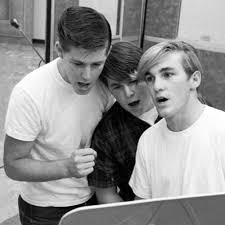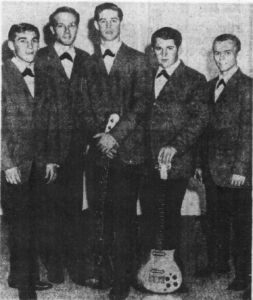November 1961
Hawthorne, California
The Beach Boys story began in Hawthorne, California, a typical suburban, southern California town, located five miles from the Pacific Ocean. It was here that Murry Wilson, an employee of the Goodyear Tire and Rubber Company, and his wife Audree Korthof settled at the end of World War II with their young sons, Brian Douglas Wilson (Born June 20 1942) and Dennis Carl Wilson (Born December 4 1944). The birth of Carl Dean Wilson on December 21, 1946 completed the Wilson family. The one thing that united the family was a love of music. Murry would later recall, “The Wilson boys have always heard music in their home, from my writing songs and friends of ours who came over.” Murry was a frustrated songwriter and spent hours at the piano coming up with polka and easy listening tunes. His proudest moment came when Lawrence Welk performed his own composition “Two Step, Side Step” on his television show. Murry and Audree often sang duets around the piano at night and the children were expected to participate. Brian showed an aptitude for music from a young age and mastered the piano by age ten. He loved the family harmonizing and would often sing with his brothers for fun. The Wilsons’ cousin Michael Love (Born 1941) went to Dorsey High, a mostly black school, and he developed a love for the R&B music that the kids there listened to. Mike and Brian were near in age and Brian liked singing with Mike, because his bass voice added another element to the vocal blend he had developed with his brothers. Brian, who had developed an outrageous falsetto, would always take the top line, while Carl and Mike took the bottom parts and Dennis filled in the middle register. They soon realized that they sounded very good together.
It was in 1958 that Brian made one of the most important musical discoveries of his life. His mother took him to a record store where he first heard the music of the modern jazz vocal quartet, the Four Freshmen. Their pioneering style of close vocal harmony had a profound impact on Brian. As he explained in 1964, “I heard the Four Freshmen years ago and right away I flipped. They had the most unique harmony, the best arrangements and a fantastic blend of voices.” Carl recalled that his older brother would play the piano for hours, recreating the music that he heard on Freshmen records note for note. Brian taught his brothers and his cousin Mike all the parts to their songs, especially “Their Hearts Were Full of Spring” and “Graduation Day” and rehearsed them constantly. As they got better at it, he even began to create his own unique arrangements of the songs. Brian’s parents got him a tape recorder and he would record his vocals over and over again, creating harmonies and counter harmonies.
Carl was just as interested in music as Brian. His passion, however, was reserved for the guitar. In a 1966 article he related that “A friend of my parents, a fantastic guitarist, often dropped by to play…Whenever he put down the guitar I’d grab it and start messing around…The instrument fascinated me…My folks bought me a guitar when I was 12.” He soon was practicing all the time, eagerly copying the riffs he heard on the records that he loved. Mike continually pestered Brian to form a real musical act and see if they could make some money at it. Brian was intrigued by the idea, but it seemed farfetched. Brian and Mike would often get together to sing with Mike’s sister Maureen or Brian’s friends, but this was more for fun. No one in Hawthorne believed that you could really make a living at music. Still, they would sometimes appear at talent shows or school assemblies. Indeed, it was at one of these events in 1960, billed as “Carl and the Passions,” that Al Jardine first saw them sing.
Al Jardine was born in Lima, Ohio in 1942 and had moved to California with his family in 1955. He met and became friends with Brian when they both played football together for the Hawthorne High Cougars. Al and Brian shared a love for music, though Al’s tastes ran more to the Kingston Trio and other folk acts. Al reconnected with Brian in 1961 at El Camino College. He was so impressed by Brian, Carl and Mike’s vocal blend when he saw them perform that he decided to form a group with them. They called themselves the Pendletones, after the checkered shirts that were so popular at the time. Despite his reputation as a troublemaker, Dennis was also included in the band to please Audree Wilson. As Carl recalled, “We began practicing vocal harmonies every chance we had. Mostly we sang Coasters songs and Freshmen arrangements, as Brian was high on their style of vocalizing.” After some rehearsing, the new group decided that they would go to Hite Morgan’s studio and make a record. The Morgan’s were happy to oblige, but saw little potential in the material that the boys were doing or in their rudimentary musical abilities. Things might have ended right there, but fate intervened. Dennis yelled out “Write a song about surfing!” The Morgan’s were intrigued. Surfing was the rage in Southern California and a song about the sport had surefire commercial potential in California. Brian and Mike liked the idea and wrote a song. In November 1961 they recorded a single of Surfin’/Luau for the tiny Candix Records label and it slowly rose in the local charts.
Saturday December 23, 1961
Rendezvous Ballroom, Balboa-Newport Beach, CA-with Dick Dale
With “Surfin’” in the California charts, the next step was to do some promotion. The only problem was that not everyone in the group could play an instrument. It was decided that Brian would be the onstage bassist and Dennis would be the drummer. Carl remembered “My dad bought Brian an amplifier and a bass which he learned to play in…three days. Meanwhile, Dennis was whipping the drums like there’s no tomorrow. Al gave up his bass and bought an electric guitar like mine.”
The Beach Boys made their concert debut during the intermission of a Dick Dale concert. The short appearance, in which they sang two songs, apparently did not go well. Eyewitness, Dorinda Morgan later stated that Brian was “humiliated” by the rowdy crowd’s disinterest. Indeed, the Beach Boys never really succeeded in gaining the support of hard-core surf music fans, who continued to view the group as a “Hollywood” version of surf music.
Saturday December 30, 1961
Pacific Ocean Park KHJ TV Dance Party, Los Angeles CA and Olive Recreation Center, Burbank, CA
Bob Eubanks, later to achieve national fame as a game show host, hosted a local dance show on KHJ TV in Los Angeles. The Beach Boys joined the American Federation of Television and Radio Artists on December 29, so that they could appear at the Pacific Ocean Park Dance Party show on December 30. That same day, they apparently also made a promotional appearance in Burbank. The event was attended by a teenager named Jodi Gable. She was so enthralled by the group that she began attending all their shows and eventually became the president of their first fan club.
Sunday December 31, 1961
Municipal Auditorium, Long Beach, CA-with Ike and Tina Turner, James Darren, Frankie Avalon, Della Reese, Gene McDaniels and Bobby Rydell
On New Year’s Eve the group appeared at the Ritchie Valens Memorial Dance in Long Beach, sharing a bill with Ike and Tina Turner. It should be noted that no advertisement or photo has ever been found of this event. This, however, was not as uncommon as it sounds. Conservative newspaper editors and writers generally showed little interest in youth culture in the late 5os and early 60s. The photo is the only one known to exist of the Beach Boys with Al Jardine in his first short tenure with the band. It was taken at an early gig in December or January.
The band probably didn’t make much of an impression on the crowd. In a 1967 article, Mike admitted, “I didn’t think we were very good. We certainly didn’t look great. We wore ochre colored sports coats which cost us $30 each and our slacks, shirts and ties weren’t what we’d have chosen for leisure wear…but the thing then was for groups to wear uniforms, so uniforms we wore.” Nevertheless, despite his low opinion of their performance, for Mike the show was a major turning point. He recalled in 1975 that the group was paid $300. “My uncle, our manager, didn’t take a cut. We each walked up to the box office and got $60 cash-no mailing it to us later.” Getting paid for making music was a revelation to Mike. Suddenly, he realized that the Beach Boys might actually be the ticket to the American dream.


